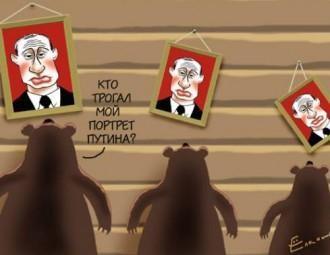Stanislau Bahdankevich: There is a little bit of Putin in almost every Russian
 funnypicture.zoda.ru
funnypicture.zoda.ru
The only way to avert Russian aggression is to introduce the peacekeepers at the Ukrainian territory. However, US and EU are incapable of that.
On April 28 US expanded Russia sanctions. The “black list” now includes 7 officials: Russian President’s representative in Crimea Oleg Beloventsev, vice PM Dmitri Kosak, Rosneft CEO Igor Sechin, Rosteh CEO Sergey Chemezov, head of the State Duma international affairs committee Alexei Pushkov, director of the Federal Security Service Evgeni Murov and senior deputy head of the President’s Administration Vecheslav Volodin.
The same day the EU decided to expand “black lists” and included 15 more Russian officials in it.
It has been two months since both the US and the EU started introducing sanctions against Kremlin. However, they didn’t stop the Russian aggression, and they hardly will: Barack Obama admitted that he doubts that the sanctions are efficient.
Stanislau Bahdankevich, former head of the National Bank of Belarus and honored member of the United Civil Party told EuroBelarus Information Service why sanctions only give creeping effect, which won’t stop Russian aggression into Ukraine.
- The US have introduced a new portion of sanctions against 7 Russian citizens and 15 companies. The EU has decided to introduce 15 more Russian officials into the black list. Will the announced sanctions change Kremlin’s stance towards Ukraine?
- The sanctions should urge Putin to review his attitude towards his plan and towards the realization of this plan. However, only immediate introduction of peacekeepers can stop Russian intervention into Ukraine; but US and EU are incapable of that.
Moreover, Putin has decided to keep Ukraine in tension, sending out provocateurs, subversives, arming Ukrainian separatists. Russia is trying to make Ukraine recognize Crimean annexation; after that it might give up its plans on the south-eastern part of Ukraine.
But we don’t know exactly what Putin’s thoughts are. He demonstrated that he is unpredictable, that he is an aggressor; he has ruined his relations with the world community, has ruined the world order and the order at the post-Soviet area, too.
- Former sanctions of US and the EU went unnoticed for Russia. Barack Obama also admitted that he doubts that the sanctions are efficient. Why should the sanctions be introduced in the first place?
- The sanctions are effective; but this effect is creeping and slow. US and EU sanctions will be affecting Russia for centuries. The law affects both those who apply it and those to whom it is applied; this is how it works.
Russia won’t turn into a civilized country. But the main thing for Putin is to restore the Russian empire. And Russian empire has never been wealthy, and is unlikely to become wealthy in the future.
- The announced sanctions have in no way affected Vladimir Putin, who is the main person to blame for the Kremlin’s aggression into Crimea. Why is it so?
- There is no enough leverage to introduce personal sanctions against Putin; everything he owns is in some other persons’ name. I think that Putin keeps his savings in the third-world countries. Moreover, we can’t close Russia, whatever it might be, as it is still a strong nuclear state.
- It is hard to concede that two world monsters – US and the EU – have no leverage to influence Russia. Why are these sanctions so strange?
- Let me repeat one more time: the only way to avert Russian aggression is to introduce peacekeepers into the Ukraine’s territory; Putin would never dare to start a world war openly. But neither US nor EU are capable of that; neither separately, nor together.
Aggression has already cost Russia an astronomical sum: capital is being taken out, heavy inflations is going on, national currency is being devalued at a high rate –dozens and hundreds of billion dollars are at stake here. But the trouble is that dictators never notice that the life of their people is worsening.
Moreover, I fully agree with the assessment given by Sviatlana Alexievich, who said that there is a little bit of Putin in 90 per cent of Russians. If you turn on Russian TV channel “Russia 24”, you’ll hear that they are chanting fascist slogans “Russia is above all!” 24 hours a day. Back in time, Nazis also chanted “Germans are above all”.
I know only one pure democrat in Russian beau monde – Boris Nemtsov. There is a little bit of Putin in almost every Russian.
-
03.01
-
07.10
-
22.09
-
17.08
-
12.08
-
30.09








































